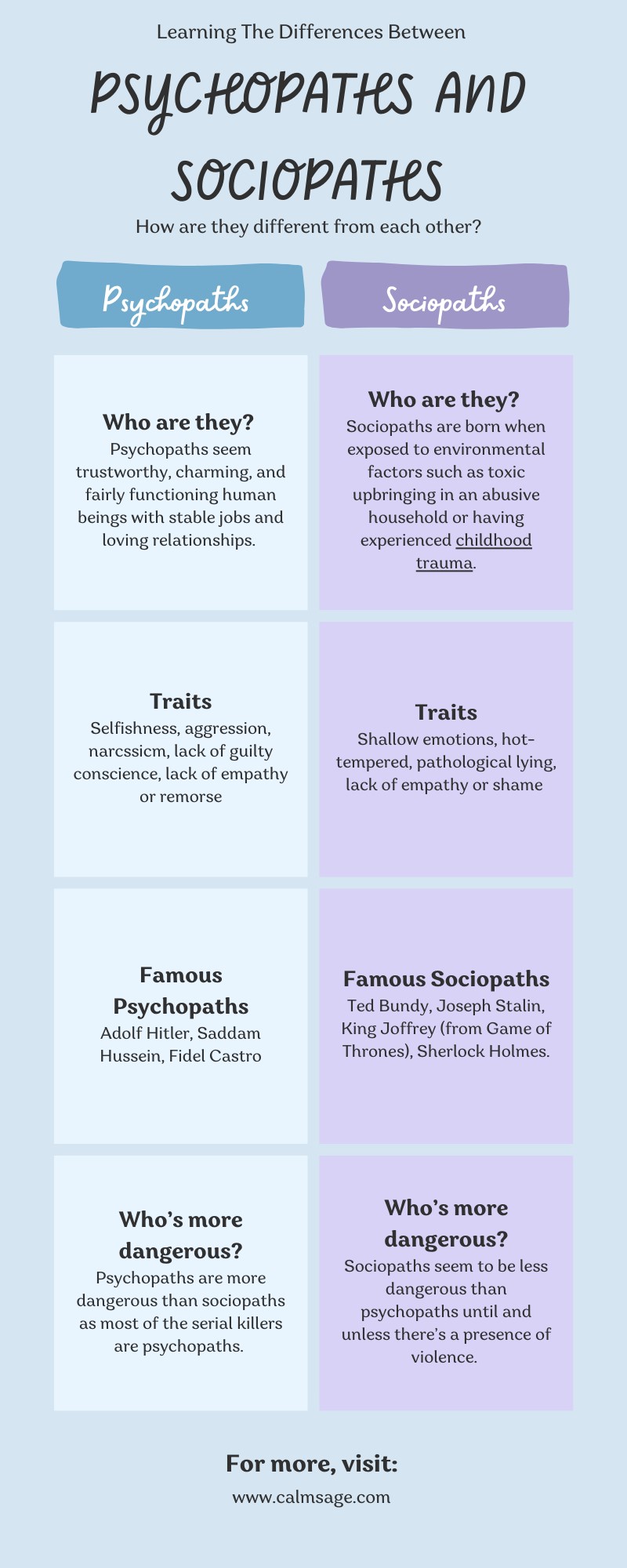Psychopath vs Sociopath: What’s The Difference?

While working at the office or chilling at a cafe, I have often observed different personalities. During my observations, I’ve come to realize that what someone portrays themselves as may be a lot different from what they are.
Have you ever watched the movie “Joker”? In the movie, the mentally troubled comedian Arthur Fleck is mistreated and disregarded by society who later experiences a downward spiral of crime and revolution. While discussing the character, the author, comic fans, critics, and the public often refer to him as a psychopath.
Moreover, in the movie “The Dark Knight”, he is a loner, unemotional, glib, and violent. These behavioral traits are aligned with a psychopath.
Now let’s take Sherlock Holmes as an example. He is idealized for romanticizing the idea of sociopaths, but in truth, they are not lovable! The primary fact is that a sociopath does not have any regard for feelings or others. They are kind of manipulative yet charming and know exactly what to speak to get what they want. But still, they do not have any conscience for others!
Many times, we get confused between these two terms; Psychopath and Sociopath. Many people even use them interchangeably, however, they do not mean the same.
Sociopaths can be used to describe a person with an antisocial personality disorder or ASPD while on the other hand, psychopaths are people with a set of personality traits that can be more severe than the traits of an antisocial personality disorder.

Let’s understand the key differences between a psychopath and a sociopath in this blog. But before that, I’ll help you understand the definition of psychopaths and sociopaths.
What Is A Psychopath?
Many experts believe that genetic predisposition can be a major cause of psychopathy. Psychopaths tend to have underdeveloped brain components, ones that regulate impulses and emotions. These people often have shallow, artificial, and manipulative relationships and they might never feel guilty after hurting their loved ones.
Psychopaths, at the first glance, may seem trustworthy, charming, and fairly functioning human beings with stable jobs and loving relationships. Famous psychopaths include Adolf Hitler, Saddam Hussein, Fidel Castro.
Common Personality Traits Of A Psychopath:
According to psychologists, some of the most common traits of a psychopath include:
- Selfishness
- Aggression
- Narcissism
- Lack of guilty conscience
- Lack of empathy
- Lack of remorse
- Impulsiveness
- Shallow emotions
- Grandiose sense of worth
- Irresponsible
- Superficial glibness and charms
Please note that psychopathy is not an official diagnosis. Some researchers have stated that psychopathy is a type of antisocial personality disorder. So sometimes, a person may be diagnosed with ASPD with psychopathic traits.
Other researchers also say that psychopathy can be a separate condition but it can still overlap with an antisocial personality disorder. Psychopathic traits can be described as a more aggressive version of antisocial personality traits.
What Is Antisocial Personality Disorder?
Before understanding who is a sociopath, let’s take a brief look at antisocial personality disorder or ASPD. While neither psychopaths nor sociopaths can be found in the DSM-5, the official term used to describe such traits is antisocial personality disorder.
ASPD is a term that can be used to define a pattern of socially irresponsible, unfair, and immaculate behavior. This personality disorder can affect how one thinks, acts, and feels. People diagnosed with ASPD often ignore or overstep others and their rights.
Classified under Cluster B Personality Disorder, ASPD traits often include being dramatic, emotional, or having unpredictable reactions.
What Is A Sociopath?
It is believed that sociopaths are born when exposed to environmental factors such as toxic upbringing in an abusive household or having experienced childhood trauma. Sociopaths are erratic, impulsive, and can face difficulties forming a healthy attachment with others while some form attachments with like-minded people and fellow sociopaths.
Sociopaths also have trouble holding long-term jobs and relationships. Some famous sociopaths include Ted Bundy, Joseph Stalin, King Joffrey (from Game of Thrones), Sherlock Holmes.
Common Personality Traits Of A Sociopath:
- Shallow emotions
- Hot-tempered
- Pathological lying
- Lack of empathy
- Lack of shame
- Incapacity for love
- Impulsive nature
- Unreliability
- Manipulative
- Parasitic lifestyle
- Need for stimulation
- Criminal versatility
Psychopath vs. Sociopath: The Key Differences
Between a psychopath and sociopath, the differences can include:
1. Conscience
Probably, the most important difference between psychopaths and sociopaths depends on the “conscience” level. Sociopaths have a weak or little semblance of a conscience, meanwhile, psychopaths do not have any.
2. Emotions
Another difference is that psychopaths are good at mimicking the emotions of people they know. For example, it may seem like a psychopath is deeply interested in you, but you’ll never know that they do not care much (or at all) about you. Sociopaths, on the other hand, are more likely to blend in easily. Both psychopaths and sociopaths lack empathy.
3. Reaction
Psychopaths tend to be pretend-upset or angry when something goes wrong as they believe that this is an appropriate reaction. These people generally do not feel anything at all but can easily mimic emotions. Meanwhile, sociopaths feel little guilt or remorse, but they continue their behavior.
4. Behavior
Psychopaths are intelligent and charming while sociopaths are impulsive and act without thinking about the consequences of their actions. Psychopaths are unemotional whereas sociopaths often show emotions and are likely to react with irritability.
5. Relationships
Psychopaths can have normal or functioning social relationships while sociopaths may find it challenging to maintain relationships. Also, psychopaths are often successful in finding their careers, sociopaths face equal hardships in achieving their goals and finding employment.

Male Psychopath vs. Female Psychopath: Is There A Difference?
Did you know that nearly 1% of the human population has psychopathic tendencies? Well, did you also know that men tend to have more psychopathic traits than women? (More extensive research on the differences in how a male psychopath differs from a female psychopath is still needed.)
Moreover, approximately 93% of the prison population is male and male psychopaths tend to be physically aggressive which kind of supports the number. Still, with the given numbers, we cannot exactly derive the conclusion that male psychopaths act more violently than women psychopaths.
Female psychopaths, on the other hand, are good at flirting and know how to use their sexuality to manipulate others. Female psychopaths have less probability of violent and aggressive attacks or crimes, however, they are verbally aggressive in their approach.
What’s more, is female psychopaths often struggle with anxiety, emotional issues, and are more likely to be promiscuous.
In the end, almost all traits of male psychopaths and female psychopaths are similar.
Sociopaths And Psychopaths: Who’s More Dangerous?
Sociopaths and psychopaths present a risk to society. However, psychopaths are more dangerous as they experience a lot of guilt which is connected with their actions.
Many of the serial killers are psychopaths as they can dissociate themselves from their actions. While violence is not an important ingredient, it is often present in both sociopathic and psychopathic traits.
How To Find A Psychopath Or Sociopath In Childhood?
Did you know that out of 100 children, every 1 child shows the traits of a psychopath or sociopath?
Now, the question that arises here is; how to find a psychopath or sociopath in childhood. Experts believe that while the condition is largely unrecognized by many, there are still some signs that can help differentiate psychopath vs. sociopath.
1. Seemingly charming personality:
Here, a child does not care if someone is under stress or hurt.
2. No remorse, No guilt:
They are very focused on their needs and are considered selfish.
3. Fascination for certain things:
A child with such traits will show a fascination for their things. They would not like nor want others to touch their stuff.
4. Insensitive towards punishment:
They are insensitive towards punishment and behave as if punishments do not matter to them. Even if their parents reward them, they will remain insensitive.
5. Lack of Empathy:
Children with such traits lack empathy. The empathy is completely flat and quiet in their brains and while they may understand, they won’t show care.
6. Short temper:
These kids will love you but the moment you go against them, they will become malevolent.
Psychopaths vs. Sociopaths: Myths & Facts
Myth 1: Psychopaths are always violent.
Fact: While it’s likely that psychopaths and sociopaths can be violent, it’s not always the case. Certain people with psychopathic traits can restrain their tendencies and achieve success in life.
Myth 2: All psychopaths are criminals
Fact: Psychopaths may commit more crimes than others but according to numbers, only about 20% of the prison population show psychopathic traits.
Myth 3: These traits are untreatable
Fact: Personality disorders, including ASPD, cannot be cured but are still treatable. With the right treatment, the symptoms can be managed.
Psychopath vs. Sociopath: How To Deal With Them?
When you finally spot a psychopath or a sociopath, there is a chance that you might make them sad, unintentionally. Below, I have provided some best ways to deal with a psychopath or a sociopath.
1. No matter how upset or frustrated you are, do not show your emotions to psychopaths or sociopaths. They can easily manipulate or mimic your emotions.
2. Assertively take your stand and do not take their bullying. Avoid showing them that you are intimidated by their acts.
3. Never buy into their stories. They tend to blame others to get to your good side. They do not show sympathy so try to keep your discussions general with them.
4. Try to keep the conversation general. Do not dig deep or too much into the past. If you feel the conversation turning, gently turn the conversation or discussion back on them.
If your loved one or close ones show these traits, check out online communication therapies. Because psychopaths and sociopaths are bad at communicating their problems one-on-one.
Diagnosis of Sociopath and Psychopath
If you think you or your loved one might be struggling with the symptoms of psychopathy or sociopathy, consider getting in touch with a certified and experienced mental health provider. You can also connect with an experienced mental health professional through online platforms.
To connect with a mental health professional from online platforms, click below:

Great for a large network of licensed therapists
-
$60 to $90/week, billed every 4 weeks
-
Therapy via messaging, phone, or live video chat
-
Flexible cancellation at any time
20% off your first month

Great for CBT Based therapists
-
$40/week, billed every 4 weeks
-
Therapy via messaging, phone, or live video chat
-
Specialization for CBT based Therapy
20% off your first month

Best for Treatment Plants
-
$60 to $90/week, billed every 4 weeks
-
Therapy via messaging, phone, or live video chat
-
Flexible cancellation at any time
$100 off your first month with code SPACE
Coming forth to the diagnosis process, please note that psychopathy and sociopathy are not considered to be mental health disorders, hence, they do not include any kind of formal diagnosis process.
However, a mental health care professional is likely to identify the symptoms of sociopathy or psychopathy as characteristics to identify the behavior of the client. This process can be done with the help of the Diagnostic and Statistical Manual of Mental Disorders 5th Edition (DSM-5).
According to the symptoms or characteristics, your professional is likely to make a diagnosis under personality disorders or other mental health disorders such as antisocial personality disorder, conduct disorder, and more.
Treatment for Sociopaths and Psychopaths
Psychotherapy is the frontline treatment for the characteristics or symptoms of sociopathy or psychopathy. In some cases, medication is also prescribed to treat some specific symptoms related to antisocial personality disorder.
-
Psychotherapy
Research shows that psychotherapy can be challenging and quite ineffective for people with psychopathy or sociopathy since these people believe that there’s nothing wrong with them. There’s a common saying that “sociopaths are made and psychopaths are born” which clearly means that they don’t recognize a need to change or they lack interpersonal skills.
However, therapy can be useful for changing certain behaviors. Here are some effective and commonly used psychotherapy options for treating sociopathy or psychopathy:
- Cognitive behavioral therapy (CBT)
- Mentalization-based therapy (MBT)
- Impulsive lifestyle counseling
-
Medication
As of now, there’s no specific medication for treating sociopathy or psychopathy. However, certain medications can help manage certain behaviors or symptoms. Some commonly prescribed medications are:
- Psychostimulants
- Antipsychotics
- Mood stabilizers
Examples of Famous Sociopaths and Psychopaths from Around the World
In this section, you’ll be able to observe that the famous sociopaths from history were young women or young men with charming personalities. Till this day, there crimes are subject of study for various psychologists around the world. Here is the list of famous sociopaths and psychopaths:
Famous Sociopaths
- Aileen Wuornos
- Billy Marfarland
- Deidre Hunt
- Diane Downs
- Elizabeth Holmes
- Jack Henry Abbott
- John Gacy
- Joey Buttafuoco
- Ted Bundy
- The Zodiac Killer
Famous Psychopaths
- Albert Fish
- Bela Kiss
- Earl Nelson
- Elizabeth Bathory
- Edward Theodore Gein
- Gary M. Heidnik
- Jeffrey Dahmer
- Joseph Mengele
- Micajah Harpe
- Ted Bundy
The BIG Takeaway!
Maybe there is that one person in your life who shows the traits of a psychopath or sociopath. Please try to understand that when dealing with psychopaths or sociopaths, punishments never work. Trying to introduce consequences, shame, or punishment for their bad behavior will only make them feel worse. Their brain does not respond to punishment.
However, positive reinforcement is the most effective and kindest thing which you can do. Try to interact with them and reward the good, and you’ll receive more of it.
For more such informational and motivational content, follow Calm Sage. You can also write to us at info@calmsage.com or DM us on social media.
Thanks for reading!





















Psychology researchers generally believe that psychopaths tends to be born — it’s likely agenetic predisposition — while sociopaths tend to be made by their environment. Nice Content.
I think you should add how to identify a sociopath or phychopathe in childhood. This will help parents. Nice content covered. Surely share with my colleagues.
Amazing content. I think the basic difference is that psychopaths tend to be more manipulative on the other hand sociopaths tend to be more erratic.
That's really a helpful content. Does it mean that Psychopath's are emotionless?
I want to know do phychopath or sociopath afraid of anything? How should I react when dealing with the.
Thank you! Keep reading. :)
I agree with you